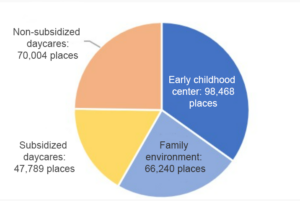
Quebec Child Care Workforce Development Snapshot
In 1997, Quebec adopted a new family policy, with the objective of facilitating work-family balance, promoting the development of children in a perspective of equal opportunity and better structuring the financial support offered to families. One of the means to achieve this is the establishment of childcare centres (CCC), non-profit organizations governed by parent users and with an accessible rate for all of $5/day. This societal choice has paid off, and has allowed a large number of women to enter the labour market, which means that among 32 OECD member states, Quebec ranks 2nd, behind Sweden (in French), for the employment rate among women aged 25 to 54.
The Quebec CCC model has served as an inspiration to the federal government in its desire to establish a system of affordable and quality early childhood education services for families across Canada.
Nevertheless, over the years, successive governments have prioritized the development of different types of childcare services, the quality and cost of which for families vary. Different pressures on the network, including a lack of recognition of early childhood professions, significant efforts made by early childhood professionals to operate emergency childcare services, and an announced demographic decline in the working population creating a scarcity of labour in several sectors of the Quebec economy, have contributed to a significant shortage of qualified labour in early childhood. This will be the challenge that Quebec will have to overcome in the coming years in order to maintain the accessibility, quality and universality of its network.

Educational Childcare Services in Quebec
There are 4 types of educational childcare services (ECCS) intended for children aged 0-5 and their families.
The early childhood network in Quebec currently consists of a majority of subsidized spaces (75%), offered to parents at the rate of $8.70/day, through three types of structures. As of July 31, 2021 (in French):
- 35% of spaces are offered in CCCs, non-profit organizations governed by parent users
- 17% by subsidized private daycares (mostly for profit)
- 23% are available in a family environment, that is to say operated by a self-employed worker who welcomes between 6-9 children into their home; this is recognized by a coordinating office, which ensures compliance with laws and standards, and which offers educational support on request
Portrait of Educational Childcare Services Network in Quebec
July 31, 2021

The fourth type of educational childcare service is made up of unsubsidized private daycares, mostly for profit, which make up 25% of the spaces offered in Quebec. They determine their own rate, and receive no money from the government. Parents have access to a refundable tax credit, which covers between 67 and 78% of the costs. The cost of an unsubsidized space remains nevertheless significantly higher for parents than the subsidized rate, and pressure is being exerted to convert these daycare centres to the subsidized model. Nevertheless, issues arise with this conversion, in particular the difficulty of several non-subsidized daycare centres to meet the criteria and requirements of the Ministry of Family in terms of employee qualification and educational quality.
However, the current supply of spaces is not sufficient to meet the needs and preferences of all parents who wish to obtain a space for their child. For example, the home childcare supply decreased by 24,202 spaces between 2016 and 2022 (in French), while 4,485 home childcare providers chose to close their childcare service.
To meet the needs, the Quebec government announced on October 21, 2021, the development of 37,000 new subsidized spaces by 2025, an increase of 17% in the subsidized network. It has also committed to monitoring and estimating new needs annually. The Government of Quebec has suggested that the vast majority of these spaces could be allocated in CCCs.

Existing Workforce
It is certain that these new developments will require a skilled, committed workforce in sufficient numbers to be able to offer quality educational services to children and their families.
In 2018, 103,000 people worked as early childhood educators (0-12 years old), in various settings, including CCCs, daycares, kindergartens, organizations for children in difficulty and in other settings where early childhood education services are provided. This is the highest proportion of early childhood workers in Canada, compared to the employed population.
Of this number, we found more specifically in ECCS, in 2019-2020:
- 36,568 educators, qualified or not[1]
- 11,173 home childcare providers
The majority, nearly 96.4%, of people working in early childhood education services in Quebec, are women.
To be recognized as qualified, an educator must have completed a diploma of college studies (DCS) in early childhood education techniques, technical training lasting 2,460 hours, or approximately 3 years from full-time studies, or the equivalent. These equivalents are often specialized diplomas in early childhood of a shorter duration, to which nearly 5,000 hours of experience are accumulated before being recognized as qualified.
The employer must ensure that at least 2 out of 3 educators are qualified and present with the children every day. However, this obligation was temporarily lowered to 1 qualified person out of 3 during the COVID-19 health emergency period. The return to the 2:3 ratio is expected 21 months after the end of the health emergency, the date of which has not yet been set, at the time of this writing.
As for the number of children that an educator can take care of, it changes according to the age of the children and the group.
| Staff/children | |
| Infants 0-18 months | 1:5 |
| Children 18-48 months | 1:8 |
| Children 4 to under 5 years old | 1:10 |
| Kindergarten 4 or 5 years old (offered in the school network) | 1:17 |
The early childhood sector in Quebec is currently distressed by a significant labour shortage, particularly for the position of early childhood educator. This shortage was already looming before the pandemic, but has been exacerbated by a shortage of workers in several other employment sectors, caused among other things by an aging population and a lower number of foreign workers welcomed in 2020.
A collection of data carried out in November 2021 identified more than 3,780 vacant positions (in French) for educators, a worrying number which explains the pressure on employers and the difficulty in maintaining service to families. In fact, in the last year, families have begun to experience service breakdowns, particularly during unplanned absences of educators (illness, period of isolation due to COVID-19, etc.). Several ECCS have had to ask parents to keep their children at home on certain days because of the impossibility of finding replacement staff.
Given the objective of developing 37,000 subsidized spaces, the Ministry of Family estimates that it will be necessary to recruit nearly 17,800 additional people, and qualify 8,000 of the existing educators who do not yet have their qualification.
In this context, a historic salary catch-up was granted in 2021 in the subsidized network. This increase, which varies according to the job categories, corresponds to an increase of 18% for qualified educators and specialized educators, 10% for unqualified educators, and fluctuates between 8 and 12.5% for other functions (assistant educator, secretaries, food manager, officers)[2].
|
Qualified Educator |
Non-qualified Educator |
Assistant Educator |
|
|
$ |
$ |
$ |
|
| Lower Step |
21.60 |
18.52 |
17.85 |
| Higher Step |
30.03 |
27.78 |
19.61 |
| Number of Steps |
10 |
14 |
4 |
Benefits are part of employee compensation in the subsidized network, including a 6.6% employer contribution to the Pension plan for CCC employees and private daycare centres under agreement in Quebec with defined benefits, group insurance, 13 statutory holidays and 2-5 weeks of vacation, depending on seniority.

Expansion of Current Workforce
In order to act on the issue, the Government of Quebec has launched Operation Workforce (in French), and invested nearly $295 million in order to train, requalify and recruit the workforce.[3]
These measures are recent, and it is still early to judge their effectiveness. Their success will depend on the ability of the Government of Quebec to deploy them in collaboration with stakeholders in early childhood, employment, higher education and immigration.
Attraction to the profession is an issue – enrollment in early childhood declined by 14% between 2017 and 2020 (in French). In order to reverse this trend, a campaign to enhance and promote the educator profession has been broadcasted in the media (in French).
Scholarships of $1,500 per semester will be paid to students after each successfully completed full-time semester, which represents a potential of $9,000 for the duration of the DCS in ECET. Also, work is being done to improve the attractiveness of the early childhood college program. Already, some establishments provide work-based learning (WBL) methods, which make it possible to put into practice the learning seen in class.
In addition, a paid work-study training program aims to attract and train 2,400 people interested in reorienting their careers towards early childhood, or to train those who have already taken this step. This course, which lasts 18 months, allows the ECCS to compensate participants for three days of study each week, while allocating them availability to work 2 days a week in the ECCS.
For educators with several years of relevant work experience but who have not obtained their qualification, a new program will allow employers to facilitate access to the process of recognition of prior learning and skills (RPLS) by paying part of the hours for the process. This project aims to qualify 6,750 educators.
For the first time, unqualified educators have a clear financial incentive to qualify. Previously, their salary scale ended up, after a certain time, reaching the level reached by that of qualified educators. From now on, a qualified educator will be able to obtain a maximum hourly rate of $30.03/hour, while an unqualified educator will obtain a maximum of $27.73.
The Quebec Government is placing a lot of hope in ways to accelerate training by collaborating in the implementation of training offered intensively and for which unemployed people are paid during training. These refresher courses will target, among others, people with a related diploma (special education, school adjustment, social work, community action, intervention in leisure, etc.) or a diploma in early childhood obtained elsewhere in Canada, or abroad, in order to facilitate the requalification and reorientation of people interested in working in early childhood.
The fact remains that all of Quebec is affected by a labour shortage, and new labour pools will have to be explored. Other measures are planned, in particular:
- A wage bonus to attract retired workers to return to work in early childcare
- Work underway to recruit more French-speaking foreign workers trained in early childcare
- Streamlining the qualification process with the implementation of a certification service, in order to facilitate the recognition of the qualification of people who have obtained a diploma outside Quebec
The historic salary catch-up is one of the measures in which the Quebec early childhood network places the most hope in terms of attracting and retaining early childhood professionals. This aspect is indeed often cited by experienced educators as a cause of dissatisfaction, who see in it a lack of recognition of the importance of this profession.
Already, the labour shortage is currently hitting unsubsidized private daycares the hardest, which generally offer less advantageous wages and working conditions than CCCs and subsidized daycares.
Higher retention rates are also observed in workplaces that promote and value professional autonomy, invest in educational support and professional development, encourage commitment and a sense of belonging, and establish health and wellness measures.
Although implemented to varying degrees by employers, structural measures aimed at promoting the retention of new recruits and experienced staff will also be necessary (mentoring, improvement of professional development opportunities, etc.)
It is therefore on different levels that concerted action is necessary in order to meet the challenge of having a committed, qualified workforce in sufficient numbers to best welcome children and families in Quebec – from management practices to government strategies, including educators themselves as ambassadors for their profession.
- For details of other employment categories (in French)
- Radio-Canada. “CPE : les syndiqués de la CSN entérinent l’entente de principe à 93 %” https://ici.radio-canada.ca/nouvelle/1846827/cpe-greve-entente (December 13, 2021) (in French) ↑
- For more information about these measures: Become an early childhood educator





